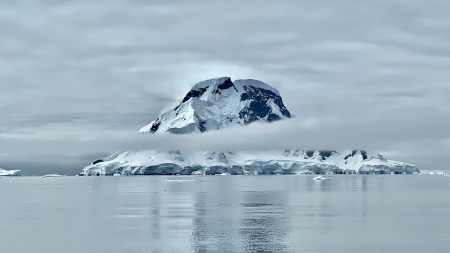Scientists estimated that a potential collapse of Antarctica’s Thwaites Glacierwhich is the size of the United Kingdom or the size of the US state of Florida, would cause a rise in global sea levels by about 65 centimetersaccording to two studies published in the journal Nature.
The joint study by an international team, made up of two groups of scientists, one British and the other American, reveal the melting patterns according to the topography of the area and describe how the interactions between the ice and the ocean influence it.
A potential collapse of the Thwaites Glacier could raise sea level to a magnitude that would have consequences for coastal populations in Europe and the world, reported the Sinc agency.
the oceanographer, Peter Davisfrom the British Antarctic Survey (BAS), and one of the authors of the work, explained that “the Thwaites Glacier, in western Antarctica, is buried below sea levelin bedrock that plunges inland and is therefore subject to the potential risk of rapid and irreversible collapse.”
According to the scientist who led the British team, “we need to understand the processes that are driving the retreat of this glacier to be able to accurately predict the rate and extent of future sea level rise.”
High variability reveals complexity under Thwaites Glacier https://t.co/XAskZq743m
— nature (@Nature) February 15, 2023
Thwaites Glacier is one of the fastest changing ice and ocean systems.
Indeed, the part where the glacier connects with the land, on the seabed, it has separated about 14 kilometers since the late 1990s.
“Melt at the land-engaging line, below the solid shelf (in the floating extent of the glacier), is a key process controlling the contribution of glaciers to future sea level rise,” Davis argued.
It was in this border area of the glacier with the submarine bottom where the MELT Project team made the observations, more precisely, under the eastern ice shelf of the Thwaites in order to understand how the ice cap interacts with the ocean in that critical sector. .
Over there, The scientists found that while there is less than expected dissolution beneath much of the shelf, the ice is dissolving faster in cracks and crevices, so the glacier continues to retreat.
The results show that the current rate of melting is slower than many computer models currently estimate.
The scientist highlighted that “these complex ice-ocean interactions are not currently incorporated into climate models, which increases our uncertainty in future sea level projections.”
At the end of 2019, BAS scientists took measurements in the ocean through a 600 meter deep well two kilometers from the ground line, thanks to a hot water drill.
These were compared with observations of melt rates taken at five other sites below the shelf.
In a period that lasted about nine months, they were able to verify that in that sector the sea water became warmer and had a higher saline concentration, but the base of the ice had melted on average, between 2 and 5 meters per year (a figure lower than expected in the previous model).
On these findings, the author points out that the results were “a surprise” and, nevertheless, the glacier is still “in trouble”.
If an ice shelf and a glacier “are in balance,” the ice on the continent will make up for what is melting or shedding.
However, the scientists found that, despite the fact that the melting is going at a lower rate than estimated, “there is still a rapid retreat of the glacier”, which makes them predict that “it does not take much to unbalance it”, they indicated.
















